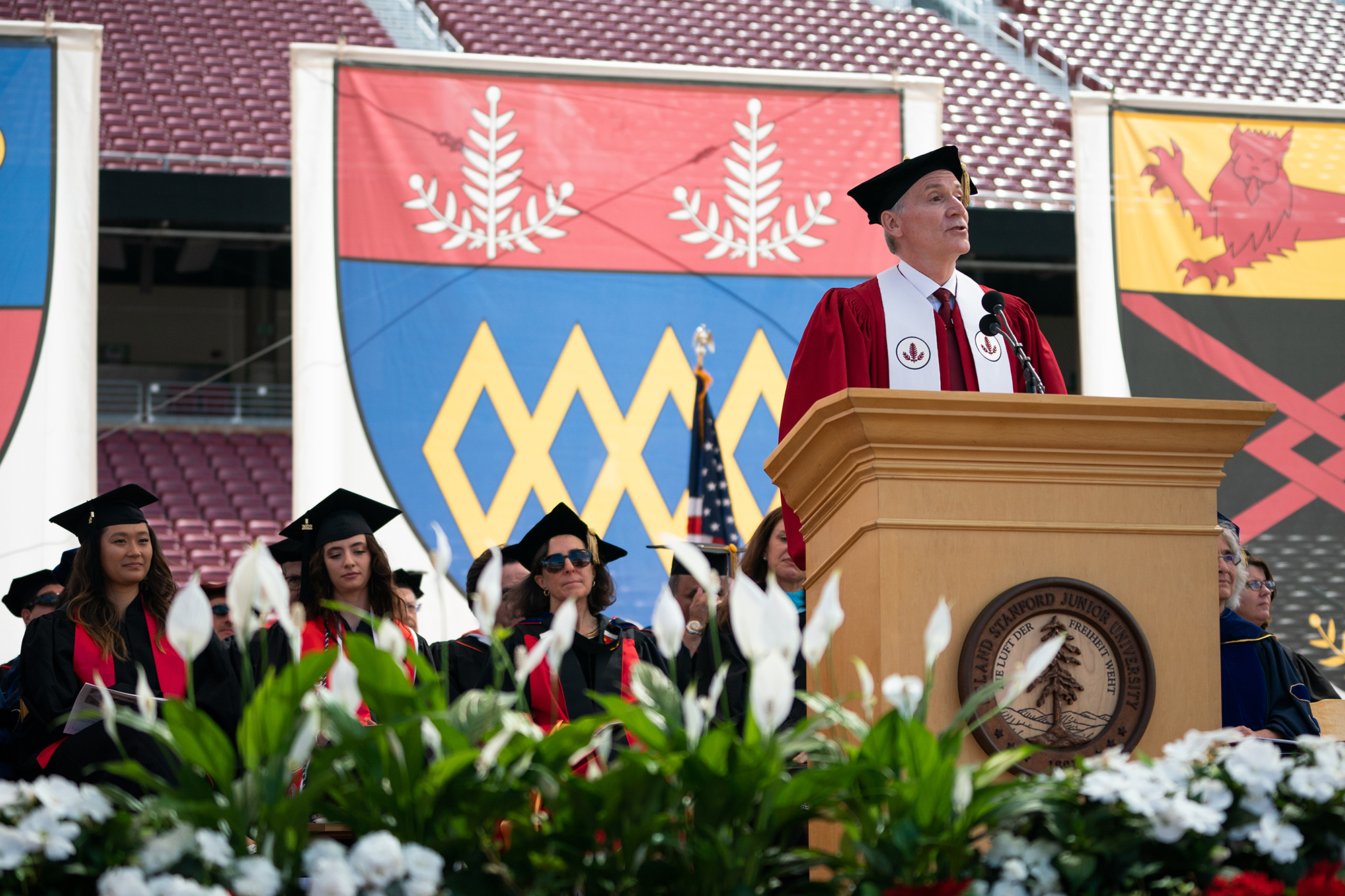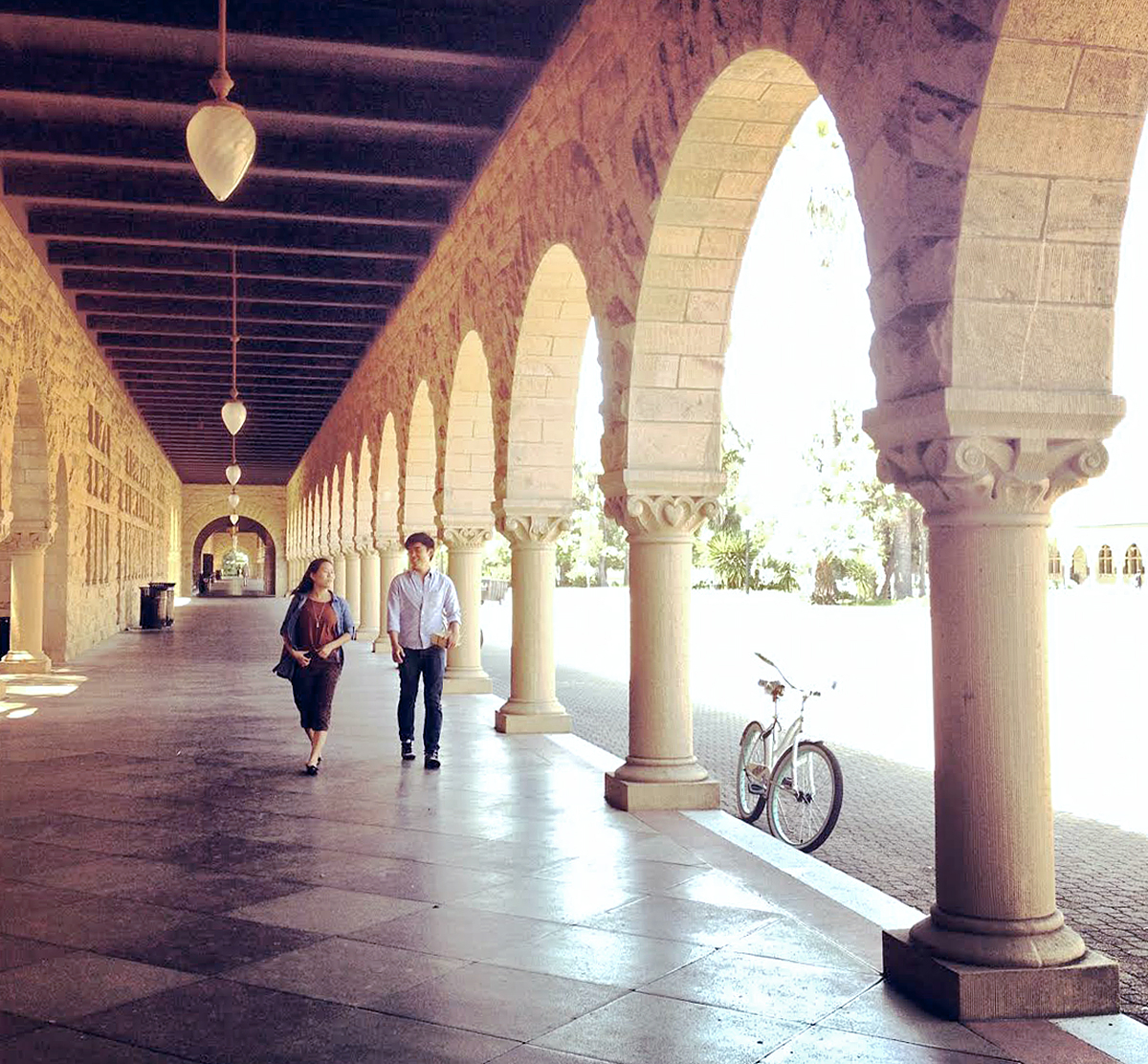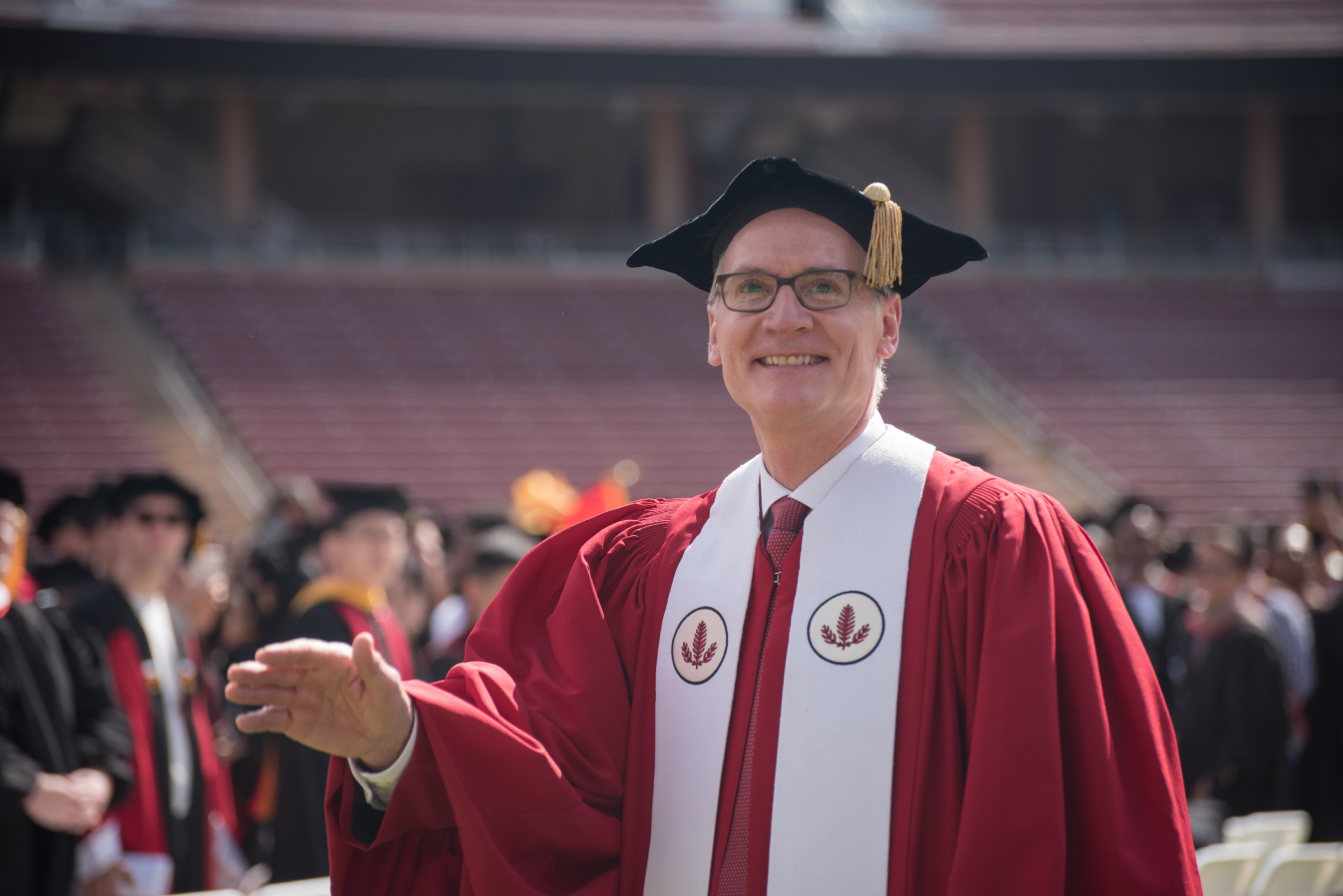• Review Marc Tessier-Lavigne's tenure as president of Stanford University
Stanford University President Marc Tessier-Lavigne announced on Wednesday, July 19, that he will be stepping down after a panel of experts found significant flaws in various studies that he had supervised more than a decade ago. While the panel cleared him of personally committing scientific fraud, Tessier-Lavigne was criticized for allowing work to be published that contained errors and "manipulation of research data."
In a letter to the community, Tessier-Lavigne indicated that ongoing discussions about the panel's report would hamper his leadership of the university, at least in the near term, and that the university would be better off with his resignation as of Aug. 31.
Tessier-Lavigne, a neuroscientist who was appointed Stanford president in 2016, has been under increased scrutiny in recent months after various stories reported by the campus newspaper, The Stanford Daily, alleged in November that numerous papers that were published under his supervision had falsified data and other flaws. The Daily had asked several science misconduct investigators to review Tessier-Lavigne's papers.
The series of stories prompted Stanford to appoint an independent scientific panel last December to review his work. The panel, led by former federal judge Mark Filip, released its report on Wednesday morning.
The panel collected more than 50,000 documents in its review of 12 papers that involved Tessier-Lavigne, including five in which he was the principal author. The review stopped short of accusing Tessier-Lavigne of personally falsifying data in the five studies that he led. It also concluded that he did not know about the manipulation of research data that occurred in his lab and was not reckless in failing to identify such manipulation prior to publication.
"Nonetheless, based on the available research record and other factors, each of the papers has serious flaws in the presentation of research data; in at least four of the five papers, there was apparent manipulation of research data by others," the review concluded.
The panel, which included five scientists who were assisted by three technical consultants, found that a group of three papers published between 1999 and 2001 -- one in Cell and the other two in Science -- re-used a single blot image and represented it as a product of three different experiments.
A fourth paper, which was published in Nature in 2004, contained images that "indicate manipulation of research data." A fifth paper, published in Nature in 2009, included "multiple errors in the work underlying the paper and the presentation of research data and methodology that, at a minimum, fall below customary standards of scientific rigor and process."
The panel also found that the 2009 paper in Nature, which was published while Tessier-Lavigne was working for Genentech, had multiple problems and that the process through which its science was developed in Tessier-Lavigne's lab "lacked the rigor expected for a paper of such potential consequence." The panel found that it had contained "various errors and shortcomings."
"In that regard, the Panel has identified issues in the paper’s underlying calculation of data and presentation of scientific images, along with inadequate disclosures regarding various aspects of the paper’s experimental methodologies," the report states.
However, the Scientific Panel disputed a finding reported by the Daily that the 2009 paper in Nature was investigated by Genentech, which had uncovered fraud; the biotech company publicly stated it did not make that finding. The panel also stopped short of concluding that Tessier-Lavigne personally manipulated the data.
The panel "did not find evidence to conclude that Dr. Tessier-Lavigne engaged in, directed, or knew of the misconduct when it occurred, and the misconduct was of such a nature that a scientist exercising reasonable care could not have been expected to have detected it at the time."
That said, the panel confirmed that several of the 12 papers it had reviewed "exhibit manipulation of research data." The panel also found that Tessier-Lavigne had "failed to decisively and forthrightly correct mistakes in the scientific record."
In a cover letter accompanying the report, Filip noted that Tessier-Lavigne will retract at least three of the five papers in which he was the lead author and, "at minimum, pursue robust corrections as to the other two."
"The Scientific Panel agrees that significant action is appropriate to correct the scientific record," Filip wrote.
In his letter to the community, Tessier-Lavigne asserted that he had "never submitted a scientific paper without firmly believing that the data were correct and accurately presented" and said he was "gratified that the Panel concluded I did not engage in any fraud or falsification of scientific data."
He also acknowledged the panel's conclusions about areas where he "should have done better."
"I agree that in some instances I should have been more diligent when seeking corrections, and I regret that I was not," Tessier-Lavigne wrote. "The Panel's review also identified instances of manipulation of research data by others in my lab. Although I was unaware of these issues, I want to be clear that I take responsibility for the work of my lab members.
"I expect there may be ongoing discussion about the report and its conclusions, at least in the near term, which could lead to debate about my ability to lead the University into the new academic year."
Tessier-Lavigne confirmed in his letter that he will retract three papers and correct two others.
These findings have also caused him to "further reassess the processes and controls I have in place."
"While I continually maintain a critical eye on all the science in my lab, I have also always operated my lab on trust – trust in my students and postdocs, and trust that the data they were presenting to me was real and accurate," Tessier-Lavigne wrote. "Going forward, I will be further tightening controls, including, for example, more systematically matching processed images to original raw data, both in the course of each scientific study and especially when bringing a study to publication.
"I will vigorously apply this and other best practices to ensure that these kinds of problems do not recur."
With the resignation, the University's Board of Trustees is preparing to begin its search for Tessier-Lavigne's replacement. Jerry Yang, president of the university's Board of Trustees, said the Board has appointed Richard Saller, a European studies professor, to serve as president of Stanford University on an interim basis. His appointment will begin on Sept. 1 and will continue until the next president of the university is in place.
Saller, who was the dean of the School of Humanities and Sciences after joining Stanford in 2007, is the Kleinheinz Family Professor of European Studies. Before coming to Stanford he served as the provost and dean of social sciences at the University of Chicago, where he spent 22 years, according to an article about him in Stanford Magazine.
His history with Stanford dates back to when he was a fellow at Stanford's Center for Advanced Study in the Behavioral Sciences in 1986-1987. In 2001, he was part of a team of specialists in ancient history who reviewed the academic standing of Stanford's classics department.
Saller is a Roman historian with interests in social, economic and cultural history. He received bachelor's degrees in Greek and history from the University of Illinois and a doctorate from Cambridge University, according to his Stanford bio. He was inducted into the American Academy of Arts and Sciences as a fellow in 2005.
He has taught at Swarthmore College and held visiting professorships and fellowships at the University of California at Berkeley and Jesus College, Cambridge.
Yang outlined the plans for hiring Tessier-Lavigne's successor in a statement: "In the coming weeks, the Board will appoint a search committee and will share more information about the process for selecting the University's next president."
Yang lauded Tessier-Lavigne for his seven years of service and "outstanding accomplishments" which included the creation of Stanford's first new school in seventy years, the Doerr School of Sustainability, and his work in ensuring that "Stanford retained its standing as a world-class institution through the unique challenges presented by the COVID-19 pandemic."
But in light of the report, Yang said that the board has decided to accept Tessier-Levigne's resignation and "agrees with him that it is in the University’s best interests." Yang noted that Tessier-Lavigne will continue in his position as a tenured professor in the Department of Biology.
Here's a look at the university's milestones under Tessier-Lavigne. (To advance slides on desktop or laptop, hover your cursor at the far right and click.)





Comments
Registered user
Duveneck/St. Francis
on Jul 19, 2023 at 11:21 am
Registered user
on Jul 19, 2023 at 11:21 am
Eventually, they are all found out.
Registered user
Leland Manor/Garland Drive
on Jul 19, 2023 at 12:05 pm
Registered user
on Jul 19, 2023 at 12:05 pm
20 years from now, various 'scholars' will be exposed for having used artificial intelligence (AI) to create their erudite research papers.
The only occupations that cannot be replaced by AI are jobs requiring manual labor or the use of hands and workers in those areas will eventually rise to the top of the economic food chain.
App developers, paralegals, administrative assistants, teachers, marketing/sales professionals, and various entry-level jobs are history.
And in some ways this development will be good for society because college degrees are overated, costly, and for many students...a temporary escape from adult world responsibilities.
Registered user
Old Palo Alto
on Jul 19, 2023 at 12:23 pm
Registered user
on Jul 19, 2023 at 12:23 pm
I thank Stanford's President and Board for making the high-integrity decision to seek new leadership. Now is a great opportunity to spend time casting a wide net of maximally diverse candidates -- politically, ethnically, racially, gender-wise, geographically, and otherwise.
Finding the most qualified candidates always requires searching the most diverse candidate base. Only by taking extra time to go beyond Stanford's existing networks and potentially shallow pools of candidates will Stanford find the most qualified new leader. I hope that Stanford will choose to do that extra work, drawing upon its unprecedented financial resources to succeed.
When Stanford takes the extra time and spends the extra money to maximize its search pool and optimize the quality and diversity of its candidate pool, I hope that Stanford embraces the values of diversity and representation, which provably strengthen communities and improve the quality of decision-making and judgment. Echo chambers otherwise may result, as they have at Stanford in the past.
Perhaps, when Stanford does this extra work to find the best candidate, Stanford will land on a candidate who is a woman, maybe even a minority woman, as did my other Alma Mater, Harvard University. Harvard's current President not only is diverse and representative of the Harvard community -- but also she also is a Stanford Alumna, who was potentially available to recruit until this past year.
To be clear, however, President Gay, Stanford '92, is one of numerous exceptionally qualified diverse academic leaders. Unlike in the past, the pipeline now is filled with ample brilliant, inspiring, successful, well-respected diverse potential candidates--most of whom did not attend Stanford like Harvard President Gay. Please, Stanford, take the time to find a President that can best serve and represent our values and commitment to integrity and excellence by prioritizing diversity in your search.
Thank you.
Rebecca Eisenberg
Stanford '90 BA Decision Science
Harvard '93 JD Law
Palo Alto, CA
Registered user
Palo Verde
on Jul 19, 2023 at 2:13 pm
Registered user
on Jul 19, 2023 at 2:13 pm
So if he didn't do it, who did? Why is there no mention of investigations/consequences for the students and others who did manipulate the data? There were at least five publications over a period of several years, so there obviously is more than one individual at fault.
Registered user
Midtown
on Jul 19, 2023 at 3:13 pm
Registered user
on Jul 19, 2023 at 3:13 pm
I suspect this is the peak of the iceberg. The U.S. higher education system: an insulated, unaccountable, highly funds, stratified, money guzzling system probably has a lot more to hide.
Registered user
Another Palo Alto neighborhood
on Jul 19, 2023 at 4:36 pm
Registered user
on Jul 19, 2023 at 4:36 pm
Other headlines elsewhere are calling this manipulation of data.
That description seems to be something that happens everywhere whenever certain results are expected. Surveys, polls, questionnaires, you name it. Manipulation of data to get a required result is common place. And it isn't just scientists, but journalists, politicians, even city departments, do it to get the favored results.
Let's hope the tide starts to turn now.
Registered user
Another Palo Alto neighborhood
on Jul 19, 2023 at 4:49 pm
Registered user
on Jul 19, 2023 at 4:49 pm
This article raises more questions than it answers. Why was the investigation begun? What happened to peer review? Publication is hard and peer review should have caught all this. Is this evidence of the political in academic publishing trumping scientific review? Or something else?
Registered user
another community
on Jul 19, 2023 at 7:25 pm
Registered user
on Jul 19, 2023 at 7:25 pm
Sacrifical lamb, perhaps? All of the scandals of the last ten years, this is no surprise.
Registered user
another community
on Jul 19, 2023 at 7:51 pm
Registered user
on Jul 19, 2023 at 7:51 pm
Character is a learned behavior. Sadly, not everyone learned. "In the University's best interest" is an understatement.
Registered user
Mountain View
on Jul 19, 2023 at 9:59 pm
Registered user
on Jul 19, 2023 at 9:59 pm
To me, the linked report reads like a justification of a predetermined course of action, not an actual reason for Dr Tessier-Lavigne to step down. IMO the evidence reported is simply not compelling. Furthermore, if the university thinks he is unfit due to his wrongdoings, why would they return him to the role of Professor of Biology in which those wrongdoings allegedly occurred? If Stanford has decided to seek new leadership for some other reason (e.g. negative press in recent years), couldn't they have achieved this without damaging Dr Tessier-Lavigne's reputation, making it more difficult for him to effectively resume his role as a Professor of Biology? This whole thing is awkward.
Registered user
another community
on Jul 20, 2023 at 10:38 am
Registered user
on Jul 20, 2023 at 10:38 am
Fake it until you make it seems to be the norm. Who was vetting him from the beginning?
The gentleman that is going to be the interim seems to be the correct person.Better resume and well rounded.
Registered user
another community
on Jul 20, 2023 at 5:44 pm
Registered user
on Jul 20, 2023 at 5:44 pm
I wonder why he's waiting so long to clean out his desk? Anybody else who is leaving a job due to dishonesty, which is basically the reason he's quitting (before he gets fired?) .... I smell an exit package with hefty compensation to reward him ... there's no other logical reason to drag it out.
Registered user
Green Acres
on Jul 21, 2023 at 10:23 am
Registered user
on Jul 21, 2023 at 10:23 am
Technological advances and commercial applications in recent decades have led to some investigators' labs becoming essentially research organizations. The management skills of the investigators running those labs do not always measure up, which seems to be what happened here, with a failure to promptly recognize and then deal with research misconduct by worker(s) in the lab.
Since management skills are essential for Stanford's president, it's appropriate that MTL is resigning. It's also appropriate that he will continue to employ his skills in biology research as a biology professor, albeit likely with a smaller lab.